Copyright ©2006 PopEntertainment.com. All rights reserved.
Posted:
January 10, 2006.
Unlike the cases investigated by her TV alter ego, Detective Lilly Rush of
the Philadelphia PD, there is nothing cold about Kathryn Morris.
She
is the face of Cold Case, the Sunday night police drama which has
quietly become one of television’s biggest hits. The solidly crafted
weekly whodunit about unsolved mysteries features some of the most
intriguing cases on television – evocatively spanning eras, tones and
musical genres with one of the strongest ensemble casts on the air.
Now
in the middle of its third season on the air, Cold Case may not get
quite as much press as its flashier Jerry Bruckheimer produced cousins
like the CSI series or Without a Trace, but it has been
firmly entrenched high up the Nielsen ratings lists since its debut.
Websites devoted to the cases and the music played on the show have popped
up all over the internet. The series has routinely trounced timeslot
competitors like American Dreams, The West Wing, The Simpsons and
Arrested Development.
“That means a lot, because it’s a big investment,” Morris says of the
faithfulness of the show’s fan base. “A big investment of time and
following the show [from] people that believed in us from the beginning.”
It
is particularly gratifying because this is Morris’ breakout role. She has
been working in television and film for years, but none of her previous
parts had received near the scrutiny.
On
TV, most of her inroads had been in syndication. Morris was one of the
stars of the military drama Pensacola: Wings of Gold with James
Brolin and Kristanna Lokan.
“I’d never done a series that was already picked up. That was very
exciting for me. I liked the idea of the part. I was a helicopter
pilot. I was a Marine. I had to work out a ton. I had to gain all this
weight and muscle, because I’m kind of naturally a slim build,” Morris
laughs. “For me to get some muscles was really an accomplishment. Any
little bicep was really hard for me to do.”
She
had also done significant guest roles on shows like Murder She Wrote,
The Mind of the Married Man and perhaps most significantly, a
recurring role on Xena: Warrior Princess.
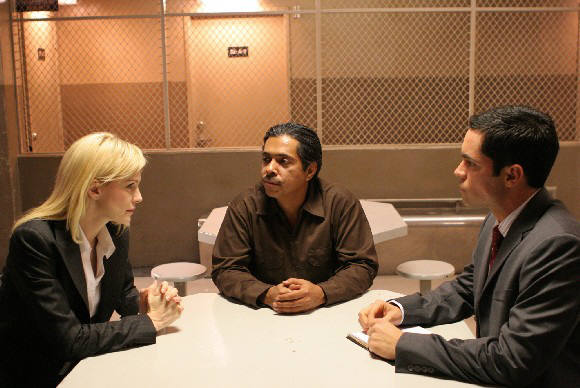 “They
approached me and said there was this Joan of Arc type of role and we just
think you’d be perfect for it,” Morris says. “It just really seemed like
a campy, fun thing to do. They treated me like royalty down there. The
cast and the crew on that show is just amazing, in New Zealand.
My little episode, or two episodes, because they brought me back because
they liked the character, I always think that was my New Zealand time.
Before The Lord of the Rings, where everybody knew how stunning it
was; I’d like to think it was still a secret place.”
“They
approached me and said there was this Joan of Arc type of role and we just
think you’d be perfect for it,” Morris says. “It just really seemed like
a campy, fun thing to do. They treated me like royalty down there. The
cast and the crew on that show is just amazing, in New Zealand.
My little episode, or two episodes, because they brought me back because
they liked the character, I always think that was my New Zealand time.
Before The Lord of the Rings, where everybody knew how stunning it
was; I’d like to think it was still a secret place.”
Morris also made serious headway in the movies, doing three films with
director Rod Lurie – Deterrence, The Contender and The
Last Castle.
The role in The Contender brought her to the attention of the
producer of that film – some little-known movie biz vet named Steven
Spielberg. Spielberg himself cast Morris in roles in his next two films –
as a futuristic singer in AI: Artificial Intelligence and Tom
Cruise’s murdered wife in Minority Report.
For
Morris, it was an honor to work with arguably the greatest director of his
time. Spielberg is also “a decent, great man,” Morris says. “He saw me
in the editing room while he was working on The Contender. Steven
loved The Contender, so Dreamworks bought it and they financed it.
He actually spotted my little work in the editing room. Then, I get a
call saying he would like to meet me. That’s how that all began. That
was amazing. To work with him twice… for him to see me in The
Contender and then to play a rock star in AI – my stuff was
completely cut out – then for him to [have] me on the set of Minority
Report – all three very different roles. For me in my career as an
actor to have a master like that really understand your range and
understand what you have to offer; it was so gratifying as an artist.”
All
of these roles would lead Morris inexorably to the character and show
which would finally expose Morris’ talent to the world at large. She was
cast in the lead role of Cold Case, a series about a group of
detectives in Philadelphia
who specialize in reopening past murders which were never solved.
Morris’ co-stars in the squad room are John Finn, Jeremy Ratchford, Thom
Barry and Danny Pino. They are all pros who have been around before in
many varied and interesting roles, but they are good character actors, the
type who sort of disappear into their roles. Because of that, people look
at them and know they’ve seen them and liked their work, but are not quite
sure what it was in.
“They are the best,” Morris enthuses. “I honestly can say that I could
not have picked four better guys to spend my years with. We’re very
close. We’ve got each others backs as actors and as people. They’re all
truly in it for the right reason – meaning the acting. They’re
friendships that will last a lifetime. That’s very rare in this business,
and extremely rare in a series. Everybody’s kind of grown up on the
show. Plus, they really treat me with a lot of respect. They let me be
the quarterback. They’re gracious about it. There’s nobody who’s prouder
of them when I throw them the ball and they’re in the end zone with a
touchdown. When I see a scene that they’re in and it just blows me away
it makes me so extra proud. I go, ‘Oh, look how good he is. He’s so
good.’”
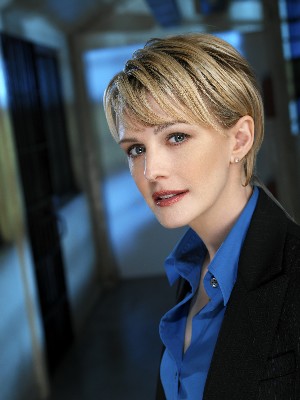 The
setting of the show works for Morris as well. Though Cold Case is
filmed mostly in Hollywood, the cast and crew do a good amount of location shooting in
Philadelphia – a
town which Morris knows well from her college days at local Temple
University. “It’s beautiful,” Morris says, “but people do bad things in
Chestnut Hill [an upscale neighborhood of the city], too. It just doesn’t
happen in Kensington [a lower income area].”
The
setting of the show works for Morris as well. Though Cold Case is
filmed mostly in Hollywood, the cast and crew do a good amount of location shooting in
Philadelphia – a
town which Morris knows well from her college days at local Temple
University. “It’s beautiful,” Morris says, “but people do bad things in
Chestnut Hill [an upscale neighborhood of the city], too. It just doesn’t
happen in Kensington [a lower income area].”
Morris’ character, Lilly Rush, is a fascinating contradiction. Lilly is
tough and smart and yet insecure. She has a fear of commitment and yet
she is totally committed to her work. Lilly cares for injured cats and
wounded souls, and yet she finds it hard to open up her own pain up to
people. She is totally feminine and yet strangely macho, fully able to be
soft and diamond-hard, totally empathetic and yet often judgmental. Lilly
has taken on one of the toughest positions in the Philly Homicide
Division, speaking for those who have been forgotten by justice.
“I
think she chose her work in order to overcome a big obstacle in her life,
which is that she wanted to matter in this world,” Morris reasons. “She
wanted to make some kind of difference. She wanted to be needed in some
way to this planet. She became guarded due to many incidences in her
life. Being a workaholic cold case cop, working with dead people, makes
it a lot easier to be detached, really. And she’s with a bunch of guys.
It’s a macho work. They’re not expecting her to get all warm and fuzzy.
But they do completely respect her tool of being completely emotionally
connected and safe for these victims and witnesses. They know that I
could get the confession, because they’ll feel safe with me. Because I am
a woman. Because I’m soft. Because I’m like a sister, like a best
friend. Like a girlfriend, and also, maybe, an intimidating hardass.
That’s what I try to play with.”
However, while the series tempts us with scintillating little glimpses
into the characters’ worlds – sometimes
even seismic shifts in lifestyle – these plot points are usually relegated
to the background. Longtime viewers of the show pick up on little nuggets
of each character’s lives and histories, like Stillman’s (John Finn)
problems with his ex-wife and daughter. Jeffries had a (Thom Barry) poor
childhood and his wife dying in an accident years earlier. It has been
suggested that Nick (Jeremy Ratchford) wants to adapt a baby and still
carries a torch for a love that got away. Sometimes these events
have serious effect on the people involved, particularly last season’s
subplots about the suicide of Valens’ (Danny Pino) girlfriend and his
subsequent clandestine relationship with Lilly’s little sister (Nicki Lynn
Aycox). Like in any job situation, these things are always in the
background, but the series does not dwell on them.
“This
year, we’ve been focusing a little more on the cases,” Morris says. “I
think that they were just trying some things, because people love the
flashbacks. I definitely feel that we will always avoid the soap opera
quotient that some shows go into. It’s more interesting if we have pieces
that are shown once in a while. We’re solving these cases. We’re busy.
We’re workaholics. Then, every once in a while, we have to remind
ourselves of our own lives. If we had too much of it, the audience would
wonder, ‘How do they get these cases done, anyway?’
“It’s fascinating when you see the dynamic we had last year. My partner,
we work very closely. I don’t really share that much with him. I
probably had shared with him more of myself earlier in the game. I’d been
very supportive of him, as much as he was able to let me in after his
girlfriend committed suicide. Because, he was my partner and I care about
him a great deal. The fact that we’re male and female and it seemed
possible that we could hook up; it’s always nice for a show. It’s kind of
hot, you know; male-female. It’s always there. Then when my sister shows
up, that just screwed everything up. He needs to grieve, he’s not, and he
doesn’t know what kind of territory he’s stepping into. That was the no
fly zone, with my sister. She knows everything about me and she’s a lot
of the source of very deep, serious pain. She slept with my fiancé nine
years before. She has asked me for money and she’s always in trouble.
She’s the only family I really have that I have any closeness to. The
objective has
been to put that in the mix with trying to solve these cases, which are
really hard. It makes it much more dramatic.”
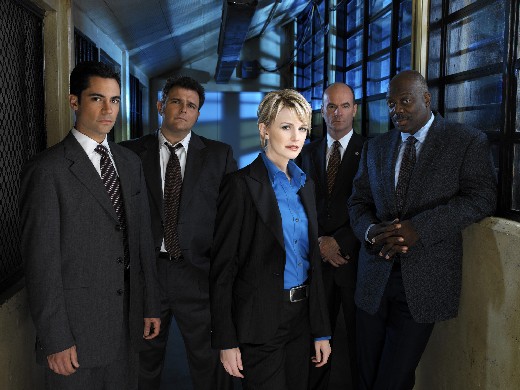 Playing
the role has given Morris a new appreciation for the difficulty of
capturing all the criminals at large. Even more so, she now realizes how
often the victims slip between the cracks and are never avenged or spoken
for.
Playing
the role has given Morris a new appreciation for the difficulty of
capturing all the criminals at large. Even more so, she now realizes how
often the victims slip between the cracks and are never avenged or spoken
for.
“A
lot of cases are waiting to be solved,” Morris acknowledges. “A lot of
departments are overloaded. What I have learned from the police
department is they are understaffed. Their resources are not as updated
as they should be. They are behind, technologically. They can’t get the
nicest computers. They can’t get the most high-tech thing that would help
track down somebody. That’s a problem for them. There are a lot of
people that are walking around that don’t want to say anything. That’s
another huge issue. And, in my opinion, I’m not encouraged by our justice
system. Especially when we see how some things have gone down in the
state of California. You know: if you’ve got money – you’re out.
Whatever it is, you’re off. I found it disturbing when they interviewed
the jurors after the Michael Jackson case. Some of these jurors I found
to be more interested in being famous, known for being on the Michael
Jackson jury, instead of what they were really supposed to be discussing.
That disturbed me.”
Just as disturbing is realizing how all this death on a daily basis can
wear on the detectives who are responsible for protecting the innocent.
This makes the character fascinating for Morris – how the constant gazes
into the heart of darkness can harden and desensitize the police. This is
why Morris was particularly moved and intrigued by two episodes last
season – one called “Mind Hunter” and the season finale “The Woods” –
about a serial killer who exploited a job as an employee in the records
room of the Police Department to find victims.
“George the serial killer was just so exciting for me,” Morris says,
enthusiastically. “I really love working with that actor, John
Billingsley. We worked so well together. It was the process of just
doing that whole sequence, the two episodes together. That was very
thrilling for me. Also, because the time between, when he was gone, I
knew that he was going to show up again. The audience didn’t know, but I
knew. I didn’t know what episode for sure, but we thought it was probably
going to be the finale. The response was so good to the first episode.
That was very exciting to know that…,” she lowers her voice eerily, “he’s
gonna be back.’ Not just for Lilly, but for me. I knew that there
was going to be another day of reckoning with George.”
Lilly’s growing cynicism was explored in an episode this season called
“Saving Patrick Bubley.” In that episode four different brothers of a
poor family are killed trying to get vengeance on a drug dealer – all
stemming from a long ago altercation in which a stolen toy on a drug
corner escalated to violence. This show is interesting because the
Bubleys were one of Lilly’s first cases as a detective, so it is the only
occasion (so far) that we have seen a green, rookie Lilly in the
flashbacks. The case obviously has caused Lilly much distress over the
years. She becomes abnormally upset with the Bubley’s mother, a drug
addict who has watched her sons get slaughtered one by one.
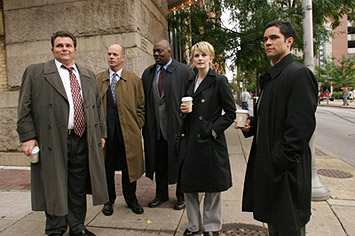 “The
‘Saving Patrick Bubley’ case – that has been the most exciting for me this
year,” Morris says. “Doing a flashback on my character and seeing how she
was when she was the new kid. And how she’s changed. How she’s changed,
although there is no mention of him, but because of George the serial
killer – and because of the situation with my sister last year and my
partner. It’s cumulative. Lilly was starting to become hardened, and
becoming less empathetic, which is what made her special as a cold case
detective. So for me, exploring all those gray areas was really
exciting. Also the truth that some of these cops, they have to look after
a lot of cases and murders that – it was just gang bangers. They get
tired. It’s an unnecessary crime. It was an unfortunate murder and it
was completely unnecessary. Over drug turf or something. For them I
think it is challenging to stay pure and not become jaded. And racist.
“The
‘Saving Patrick Bubley’ case – that has been the most exciting for me this
year,” Morris says. “Doing a flashback on my character and seeing how she
was when she was the new kid. And how she’s changed. How she’s changed,
although there is no mention of him, but because of George the serial
killer – and because of the situation with my sister last year and my
partner. It’s cumulative. Lilly was starting to become hardened, and
becoming less empathetic, which is what made her special as a cold case
detective. So for me, exploring all those gray areas was really
exciting. Also the truth that some of these cops, they have to look after
a lot of cases and murders that – it was just gang bangers. They get
tired. It’s an unnecessary crime. It was an unfortunate murder and it
was completely unnecessary. Over drug turf or something. For them I
think it is challenging to stay pure and not become jaded. And racist.
“That was sort of one thing we wanted to explore. One of my favorite
lines was when Maeve Bubley says to me ‘Oh, you think you know me? Or you
think you understand? Oh you understand? Well don’t come out here doling
your sorry ass
pity, you white police-woman.’ I thought, that is so true, because
that is exactly what is going on. What she didn’t know is I grew up in
that neighborhood. I mean, me the cop. She didn’t know anything about me
and I didn’t know about her completely, because I hadn’t walked in her
shoes. We try to go into deeper areas on
the show. To me, that’s why the show has continued to become more
successful.”
The basic structure of Cold Case – the fact that they
are able to explore different styles and eras on a weekly basis – keeps
the storytelling constantly fresh. It allows the show to experiment and
stretch out. The show can do stories about the heyday of Negro league
baseball or the dot-com boom of the late 90s. They can do offbeat riffs
like an episode about The Rocky Horror Picture Show (co-starring
Barry Bostwick, the star of that movie) or episodes built around the music
of one specific singer. Last season they did one on John Mellencamp and
recently they became the first series allowed to do an episode scored with
the music of Bruce Springsteen.
“It’s so funny. We’ll hear rumors like, what’s up next? And they’ll say,
well we’re doing the Bruce Springsteen episode, and somebody said, yeah,
that’s going to break the form for everything, you know?” Morris laughs.
“Everyone’s
always trying to crack the formula again. Because we have a magic
formula. It works. What we have, it completely works. So sometimes you
need to break it up a little bit. See what works about it, what didn’t.
Sometimes you just say, well that was just not right. Let’s go back to
what worked so great. Why do we keep trying to reinvent the recipe for
chocolate chip cookies when it’s great in the first place? But sometimes
we say, well, it would be nice if we add some pecans in there every once
in a while.”
Cold Case has
also won raves for its use of music. The series has really quirky,
interesting taste in music. They are very good at picking music that
reflects the era it is showing and yet not relying on the totally obvious
songs. For example, most shows doing a 1976 episode would undoubtedly
pull out an overplayed and clichéd piece of fluff like “Afternoon Delight”
so that they can pass ironic judgment on the time period. Cold Case
picks songs that were significant at the time – but not necessarily the
ones you have heard a million times since then.
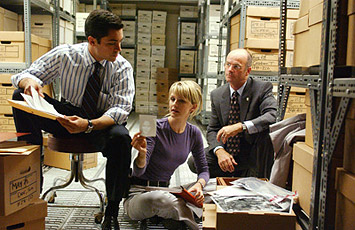 “Well,
it’s usually there’s something written in the script as to what they’re
hoping for. We did one episode where we had to shoot the same scene three
times: the one that was about the fraternity burning down, and the girls
in the fat girl pageant – that they did that terrible thing and those
girls burned down that house. They had to shoot at the beginning of the
episode the girl singing a song while she was getting ready to go to a
party. We had to shoot that scene a couple of times, with her singing
different songs, because they didn’t know which one was going to clear.
Then at the last second, we got the one
we really wanted. It’s supposed to be about a case that happened
one year ago, and the song was ‘Hey Ya!’ by OutKast. That was like, the
big song last year, all the Grammys, everything. So that was a really
great thing.
“Well,
it’s usually there’s something written in the script as to what they’re
hoping for. We did one episode where we had to shoot the same scene three
times: the one that was about the fraternity burning down, and the girls
in the fat girl pageant – that they did that terrible thing and those
girls burned down that house. They had to shoot at the beginning of the
episode the girl singing a song while she was getting ready to go to a
party. We had to shoot that scene a couple of times, with her singing
different songs, because they didn’t know which one was going to clear.
Then at the last second, we got the one
we really wanted. It’s supposed to be about a case that happened
one year ago, and the song was ‘Hey Ya!’ by OutKast. That was like, the
big song last year, all the Grammys, everything. So that was a really
great thing.
“The Bruce Springsteen thing, that’s just unheard of. I mean, this has
never been done before. But Bruce approved the outline of the script, and
he gave approval to use eight songs in this concept. So that’s really an
amazing event for television, and us. Because [show creator
and writer] Meredith Stiehm – her favorite artist is Bruce Springsteen. A
lot of the cast and crew just can’t believe it. But sometimes we’re
scrambling around and we’ll say, well, what about this? Maybe we’ll try
this song. And people will say, ‘I never heard that song.’ Or ‘I don’t
like it.’ Or some do ‘It sounds too old-fashioned for me.’ Or ‘It’s too
slow,’ or ‘It’s too fast.’ So a lot of times, there’s a lot of scrambling
around. Then sometimes, you have to settle with what you’ve got.”
Now
that she has finally found her career-making role in the somber-but
fascinating Cold Case, what would she like to try now? How would
she like to take her newfound recognition for a test drive?
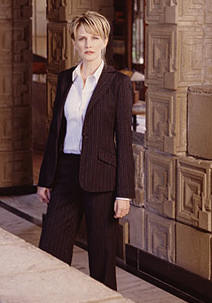 “I
love comedy,” Morris says. “I would love to do more of it. There have
actually been so many close calls on me doing some straight-out black
comedy and I’ve almost done some pretty substantial roles. I think comedy
is much harder. But I think that if you have a really strong base in
drama, then comedy is much more believable. Doing the work you do in
drama, when you do a comedy it makes the comedy so much richer and so much
more believable. I love both. Doing Cold Case, my character is
very intense. She’s a real loner and she’s very mysterious. And she’s
got a lot of issues. So, I’m always looking for a great comedy, just
because it would be really a great stretch for me. It would be fun.”
“I
love comedy,” Morris says. “I would love to do more of it. There have
actually been so many close calls on me doing some straight-out black
comedy and I’ve almost done some pretty substantial roles. I think comedy
is much harder. But I think that if you have a really strong base in
drama, then comedy is much more believable. Doing the work you do in
drama, when you do a comedy it makes the comedy so much richer and so much
more believable. I love both. Doing Cold Case, my character is
very intense. She’s a real loner and she’s very mysterious. And she’s
got a lot of issues. So, I’m always looking for a great comedy, just
because it would be really a great stretch for me. It would be fun.”
However, whether she ends up going down that road or not, Morris sees
herself continuing in the same basic direction she has been following
since she was in school plays at thirteen. She wants to stretch her
muscles and hone her skills as an actress. Mostly, she loves the fact
that she learns so much from every role.
“My
intent is to be a career actor,” she says. “I really love acting and I
would like to have a long-lasting career where I work with great people.
I’d love to do more movies. I’ve really enjoyed doing this show, and I’ve
met so many artists coming through our show and that are on it on a
regular basis… To work with people, to have Jerry Bruckheimer make my
show and have all of the fantastic people that I’ve met on our show; the
cast, crew, writers. Just all the experiences I’ve had so far, I’d like
to just continue this and work with even better and more fascinating
people as time goes on. I don’t ever picture myself being a flashy,
overexposed celebrity. If I became enormously famous, I’m sure it would
be for my work. I would much rather it be for my work than anything
else.”